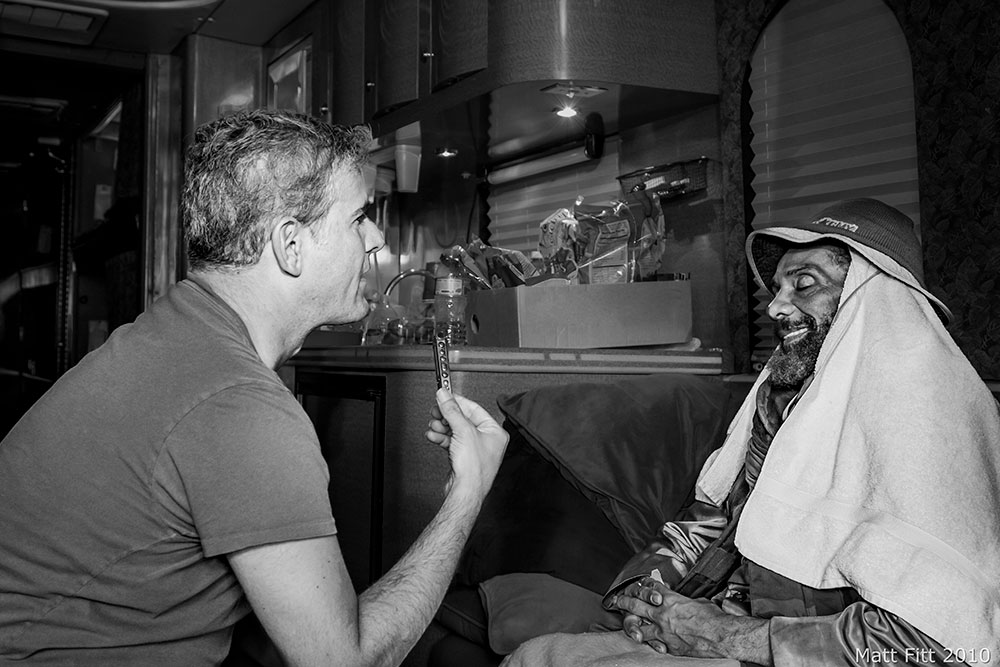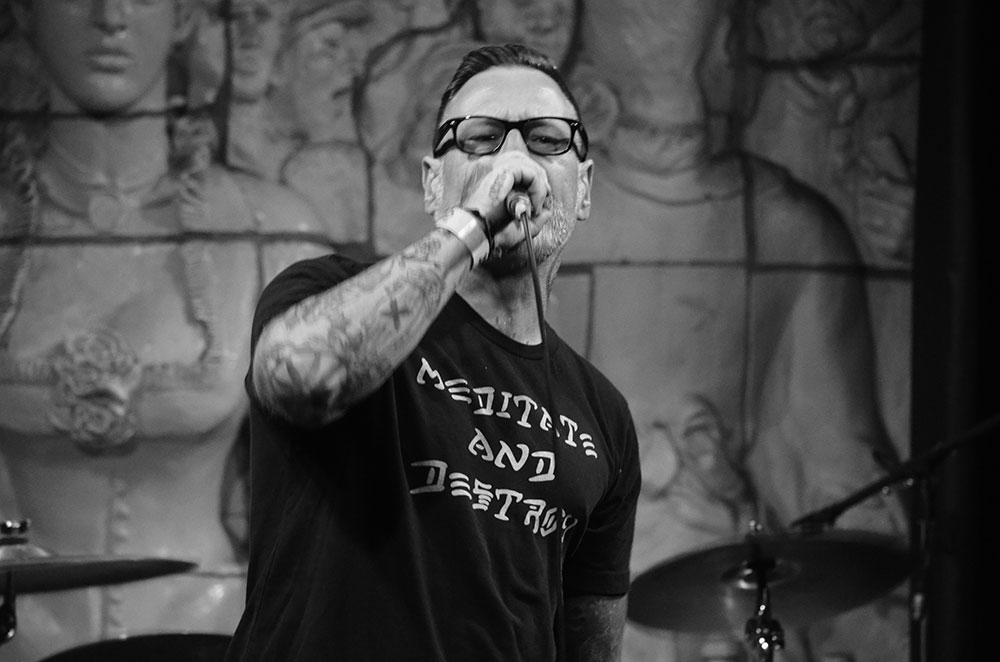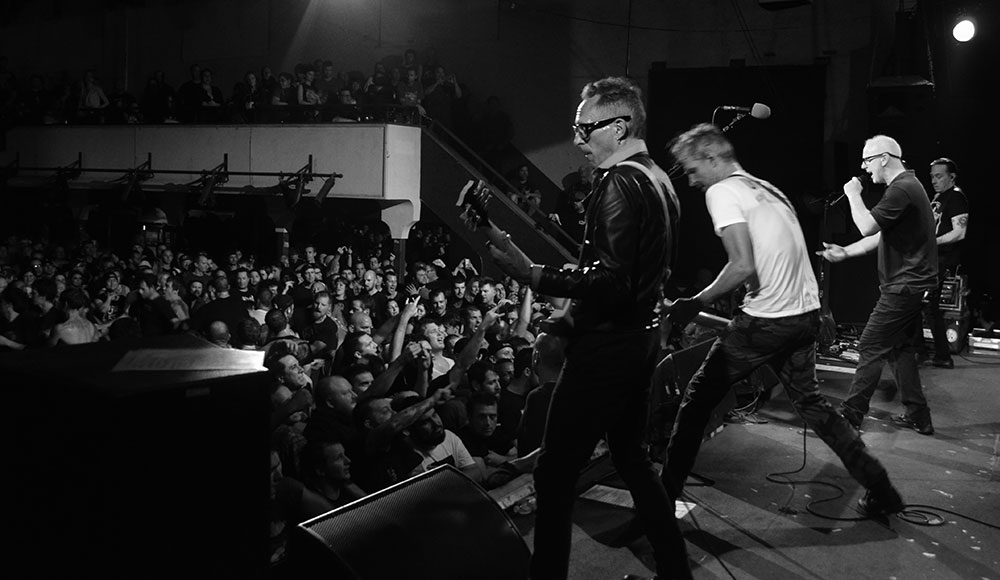Google the phrase “spiritualism in 2025” and some of the first links that pop up discuss how there’s been a growing interest in the topic. It’s no surprise. Humans have always wondered what’s “out there” beyond this mortal coil, searching for answers and security, especially during times of political and economic uncertainty. Christianity, Buddhism, Islam, Judaism, Sufism, Rastafarianism, Wiccan and even New Age beliefs are all popular options when seeking to connect with spirit.
However, there’s one belief system that won’t pop up: punk rock. Ok, admittedly on the surface one might think punk and spirituality have nothing to do with one another. One’s angry and violent, the other is calming and centering. One is seen as thriving on anarchy, the other on discipline and structure.
But they also both present ways for people to question the world around them through a set of similar values.
This is precisely what local journalist, activist and radio host John Malkin focuses on in his new book, Punk Spirit!: An Oral History of Punk Rock, Spirituality, and Liberation, released by Bloomsbury Publishing. Malkin will present Punk Spirit on Nov. 25 at the Resource Center for Non-Violence in Santa Cruz, with a full musical set by Sihasin, a Diné (the correct name for the First Nations people mistakenly called “Navajo” by Spanish missionaries) brother and sister rock duo.
“I tend to think everyone, and every group, has a spirituality to them,” Malkin says. “A spoken or unspoken philosophy about life, death, suffering, connection and creativity. Even if they don’t want to call it ‘spirituality.’”
Malkin’s second book in a series on punk rock and its connection to society and humanity at large, Punk Spirit! is a collection of more than 200 interviews he conducted between 1997 and 2025. From scene legends like Jello Biafra (Dead Kennedys/Guantanamo Bay School of Medicine), Belinda Carlisle (The Go-Go’s/The Germs), Greg Gaffin (Bad Religion), Dick Lucas (Subhumans) and Lydia Lunch to newer or lesser known musicians in the scene such as Etay Levy (of Israeli punk act Nekhei Naatza), Jeneda and Clayson Benally (Blackfire/Sihasin), and Lesley Woods (Au Pairs), there is a wide representation of voices and ideas throughout.
“Spirituality is one of those words where people can think you mean ‘running away from life,’ ‘religion’ or ‘violent control mechanism,’” Malkin explains. “But when I gave people room [for interpretation], they connected with spirituality in some way.”

Over 24 chapters, Malkin and his guests discuss numerous topics, such as how mosh pits at punk shows can act as a congregation physically letting go of their worries (like sweat lodges in Native American traditions) and a community bringing everyone together. Or that punk rock taught so many that “anger is an energy” (to quote post-punk act Public Image Limited)—something to direct at the injustices in the world and turn toward positive forces like free food shelters, harm reduction programs and environmental justice nonprofits. He also includes chapters on punk scene staples such as Krishnacore (based in Hari Krishna principles) and the non-drinking, non-smoking straight edge movement.
“I feel like a lot of people have this kind of illusion of punks not caring,” Jeneda Benally says in the book.
She—along with her two brothers, Clayson and the late Klee—formed the now defunct band Blackfire in 1989. Children of a Russian Polish-Jewish folk singer and a traditional Diné medicine man, the members of Blackfire combined punk rock with music and traditions from their ancestral roots and upbringing until the band dissolved in 2011. After the breakup, Jeneda and Clayson continued on to form Sihasin, which means “hope” in the Diné language.
“But I feel it’s the opposite,” she continues. “It’s that we care so passionately, that it’s not only about what is here and now. At least for me, it’s about what is the past and what is the future?”
It’s this sentiment which has driven Malkin throughout his life.

Growing up in Southern California, he first discovered both punk rock and Buddhism in 1979 at the ripe age of 17.
In the book Malkin writes that “both appealed to my rebellious side.”
“Punk rock pushed me toward anarchism, high-energy music and questioning authority,” he writes. “Buddhist meditation practices grounded my journey and revealed truths about interconnection, impermanence and liberation.”
Ten years later he moved to Santa Cruz, drawn to the city’s hippie activist scene by a will to change the injustices he saw around him. When the Reagan administration was in the middle of the Iran Contra scandal, he helped organize community meetings with ex-CIA agents who divulged how the United States government covertly involved itself in propaganda, assassinations and coups d’état around the world.
It was here that Malkin also began his career as a journalist. He’s been published in City on a Hill Press, Metro Santa Cruz, Santa Cruz Sentinel and Good Times.
In 1997 he joined Free Radio Santa Cruz FM, where he hosted The Great Leap Forward until 2016, when he left for KZSC 88.1FM. His current program, Transformation Highway, continues at the college station on Thursdays at noon. Over his 28-year career Malkin has interviewed musicians, artists, monks, journalists, activists and scholars discussing ideas of politics, social justice, wealth and ethics.
It’s this broad range of voices and opinions throughout Punk Spirit! that gives the book its soul. Whether they are fans of the music, spiritual seekers, or just someone curious as to how punk rock ties into spiritualism, the book allows the reader an exclusive insight into some of the most fascinating and creative minds of modern music and art.
There are even a few familiar names locals might recognize, such as Darius Koski (Swingin’ Utters) and Joe Clements (Fury 66/The Deathless/Hot Lung), both of whose bands had prominent impacts on the Santa Cruz punk scene throughout the decades. Even once punk rocker Dan Kimball—founder of Santa Cruz’s Vintage Faith Church—makes an appearance.
Because the interviews were conducted over a span of 28 years it also acts as a time machine, giving voice to those who have since passed on, like Clem Burke (Blondie) and Ari Up (The Slits). As Malkin points out in the introduction, punk’s not dead but it’s certainly getting older.
“It feels really significant because we’re at a point where the originators of punk rock are 75 years old,” he says. “It’s very special to be able to capture the voices of people who are getting older and won’t be around much longer.”
There are also a number of unexpected punk-adjacent voices in the book, such as Penelope Spheeris—director of the seminal Los Angeles punk documentary The Decline of Western Civilization along with the box office hit Wayne’s World—surreal pop artist Camille Rose Garcia (who also used to play in the punk band The Real Minx), and even Lou Reed’s former yoga instructor, Eddie Stern.
“At some point I noticed Lou Reed had put out a meditation album,” Malkin says. “Stern wrote the linear notes for it and I found him online. He was totally down to talk and was also in a punk band in his earlier days.”
Through it all, Malkin remains firmly planted in the middle of the circle pit of answers rushing around him.
“This has been central to my journalism since the 1990s,” he says. “Are people inherently compassionate or are people inherently more competitive and violent? I tend to think we are inherently compassionate and everyone wants to live a peaceful life. No one wants to worry that they will be shot, kidnaped, bombed or go hungry. These are tools used by powerful forces trying to accumulate wealth and property. But we have these spiritual teachers who—now and again—say, ‘There is another way.’”
John Malkin presents his new book, Punk Spirit!: An Oral History of Punk Rock, Spirituality, and Liberation, with a full musical set by Sihasin at 6:30pm on Nov. 25 at the Resource Center for Nonviolence, 612 Ocean St., Santa Cruz. $10. 423.1626.
Malkin will also give a reading from the book on Dec. 6 at Bound Together Books in San Francisco.











